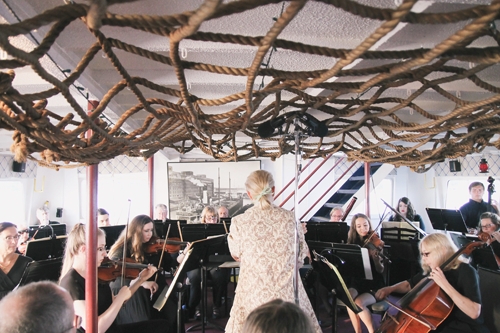Celebrating its sixth season, Muskegon’s Shoreline Symphony marked another milestone last fall when it performed in its new home, Frauenthal Theater.
The community orchestra brings together players of all ages, skill levels and backgrounds from throughout the lakeshore area to play a few concerts per year.
The 2017-18 season, Magic and Mystery, continues March 18 with What Dreams May Come, a family-friendly concert featuring a variety of music from The Secret of NIMH to Shakespeare’s A Midsummer Night’s Dream to operas like Hansel and Gretel.
Director Annette Jurcevic helped found the symphony in 2012 after moving to West Michigan and seeking out opportunities to conduct. She contacted Dan Meyers, music director at Muskegon Community College, and worked with a few others to get the word out and coordinate the logistics of practices and performances.
Jurcevic also serves as director of music at Samuel Lutheran Church in Muskegon, maintains a private teaching studio, and performs as a pianist, organist and singer. While living in Texas, she conducted the Austin Philharmonic Orchestra, the St. Edward’s University Orchestra, and the Austin Summer Pops Orchestra.
She’s trained on piano, cello, flute and plays 10 different woodwind, brass and percussion instruments, attempting to learn a new musical instrument every year.
“If you have the experience of playing an instrument, then you know what you can ask of your players,” she said. “I have found it helpful on countless occasions because I know what it feels like to play a certain way.”
Established as its own nonprofit organization, Shoreline Symphony includes professional and amateur musicians, typically out of high school, who play alongside students and faculty from several area colleges and universities. It’s the only all-volunteer orchestra in the Muskegon area to include woodwinds, brass, percussion and strings, averaging about 40 players.
Most players live in Whitehall, Muskegon, Twin Lake, Spring Lake and the Grand Haven areas, but the symphony is open to newcomers throughout the region, along with community members to serve on the board and support local players.
And while there is no formal audition process, Jurcevic asks potential players to sit in on a few rehearsals to make sure they are comfortable. She also meets with them one-on-one to see where they will fit and that they can handle the caliber of music typical of a professional orchestra.
The season includes concerts typically in November, March and June and a summer concert in August. Players can join at any time and play one concert or all of them.
“That’s one of the great things — we have flexibility,” she said. “It helps make it friendlier for the community players because you don’t have to make a commitment for the entire year.”
Concertmaster Courtney Hutson, who is also first chair violin, played with the Mona Shores High School orchestra and at Hope College. She joined Shoreline Symphony during its first season and said it’s been nice having the opportunity to perform with a symphony. Now 25 years old, she also started Uneven Ground, a Muskegon-based Celtic band, around the same time.
“I just think it’s nice to be able to continue playing classical music, because that’s the foundation for every other kind of music,” she said.
It’s a win-win for players and audiences, because it’s a good way to expose new people to classical music at a more affordable price, Hutson said.
Prior to moving to the Frauenthal, where the community college’s music ensembles now perform, the orchestra performed at churches and other venues. Last summer, the group gave a concert aboard Port City Princess while cruising Muskegon Lake.
“We’re going to continue to do unique things. That’s one of the hallmarks of our orchestra,” Jurcevic said. “I think it’s important, even for student ensembles, to be out in the community. We’re all very, very thrilled to be playing at the Frauenthal.”
Before every concert, Jurcevic hosts a discussion about the music, its historical and cultural context, and interesting tidbits about the composers “so people can really grab ahold of what they’re about to hear.”
The March concert includes a variety of music: operas, tone poems or music that paints a picture or tells a story, incidental music, a waltz, and film music, including the theme from Requiem for a Dream and “Flying Dreams” from The Secret of NIMH.
“These are both somewhat obscure films, but the music is great, and I’ll explain how they relate to the concert theme during my pre-concert discussion,” Jurcevic said. “The music itself is more diverse than you would ever think, because everyone has a different idea about what dreams are.”
What Dreams May Come
Shoreline Symphony Community Orchestra
Frauenthal Center
425 W. Western Ave., Muskegon
March 18, 3:30 p.m., $8 adults, free for students/children
frauenthal.org, shorelinesymphony.org, (231) 727-8001





